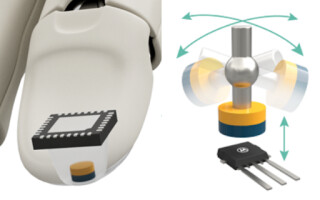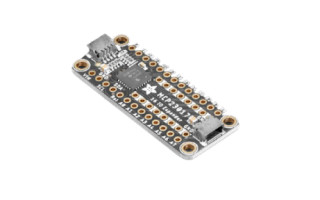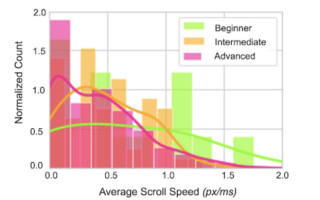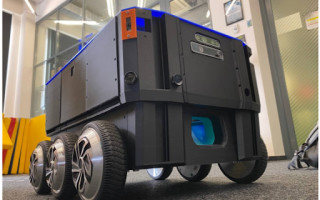Miniature Imaging System with Edge Intelligence for Remote AI Applications - Blog
May 19, 2022Remote edge AI applications are dependent on the size of the embedded hardware device that carry all the computational power and capabilities for processing edge data at the source. Large, embedded AI accelerators face several challenges in space-constrained systems such as being obtrusive and covert.
Melexis Improves Robot Functioning to Interact with Fragile Objects - Blog
April 07, 2022The highly compact tactile sensor features multiple 3D magnetometers through Melexis’ Trixaxis technology– protected against magnetic stray fields.
Non-Invasive Artificial Intelligent Olfactory System for Diagnosis of Parkinson’s Disease - Blog
April 06, 2022Parkinson’s disease is one of the most common chronic neurodegenerative diseases associated with aging. It affects body movement with primary symptoms such as tremor, rigidity or muscle stiffness, bradykinesia, and postural instability. By the time of diagnosis, Parkinson’s disease (PD) often has reached middle or late stage, leading to more complications.
Is the Google Coral Toolkit Right for Your Low-Power Edge AI Applications? - Blog
March 29, 2022After the success of Google’s first-generation scalable distributed training and inference system, DistBelief, the Google Brain team, in collaboration with Alphabet, built the second-generation system for the implementation and deployment of large-scale machine learning models, TensorFlow.
Should You Choose the Google Coral Toolkit for Your Low-Power Edge AI Applications? - Blog
March 14, 2022After the success of Google’s first-generation scalable distributed training and inference system, DistBelief, the Google Brain team, in collaboration with Alphabet, built TensorFlow, the second-generation system for the implementation and deployment of large-scale machine learning models.
JUST: An End-to-End Approach for Multilingual ASR - Blog
March 03, 2022There is an increasing demand for the use of automatic speech recognition in customer service agencies and corporations to reduce procedural complexity. To bring competitive performance and architectural simplicity, an end-to-end automatic speech recognition system has emerged as a savior.
ML-EXray: A Cloud-to-Edge Deployment Validation Framework - Blog
March 03, 2022The increasing deployment of embedded AI and ML at the edge has certainly introduced new performance variations from cloud to edge. Despite the abrupt negative change in AI execution performance on the edge device, the adoption of TinyML is a way to move forward.
Lenovo Picks Synaptics’ Katana Edge AI Platform for Yoga 11 Tablet - Blog
March 03, 2022Within three weeks of the release of Synaptics’ Katana low-power edge AI platform, Lenovo announced its successful partnership with Synaptics to adopt the Katana system-on-chip for their latest devices of the Yoga family of tablets. Taking advantage of the low-power Katana SoC architecture and energy-efficient AI software, Lenovo plans to deliver premium voice communication and voice assistant features in Lenovo’s Yoga 11.
Syntiant Releases TWS Earbud Reference Design Based on NDP100 Neural Decision Processor - Blog
February 16, 2022Syntiant introduced a reference design for true wireless earbuds to enable faster time to market for ODMs and OEMs. The ultra-low-power design comes with the NDP100 neural decision processor that provides more than 100x performance and 10x throughput at under 140 microwatts for always-on AI voice processing.
Onera Health Showcases ONE010 Biomedical-Lab-on-Chip for Wearable Devices - Blog
February 10, 2022We witnessed many advancements at CES 2022, and nothing is left behind in the embedded health industry. Onera Health launched the Onera Biomedical-Lab-on-Chip, an ultra-low-power biosignal sensor subsystem for wearable devices. This biomedical compact chip is designed for processing multiple biosignals creating a massive opportunity for health devices.
Adafruit Unveils the MCP23017 I2C GPIO Expander Breakout Board - Blog
January 28, 2022Adafruit, a US-based embedded electronic device manufacturer, known for its popular development boards, external sensors, and supporting hardware aiding the maker community. A while ago, the manufacturer released a 16-pin integrated circuit based on the MCP23017 I2C input/output port expander. The MCP23017 uses two I2C pins that can be shared with external I2C devices which provides 16 general purpose pins in return.
Stochastic Computing Architecture for Efficient Use of TinyML - Blog
January 11, 2022Neural networks are a popular machine learning model, but they demand higher energy consumption and more complex hardware design. Stochastic computing is an efficient way to balance the trade-off between hardware efficiency and computing performance. However, stochastic computing witnesses low accuracy of ML workloads due to arithmetic units' low data precision and inaccuracy.
Google Presents Predicting Text Readability Through Reader Interactions - Blog
January 10, 2022Prediction of text readability has become an area of research due to the increasing complexity in the educational content.
Debian and Yocto Project: How to Get The Most Out of Your Linux Distribution - Blog
January 07, 2022When it comes to the operating system required for embedded systems, the Linux distros have been the most favorable choice for developers. The reason being, the framework has made it convenient for developers to choose their target operating system.
Microsoft Introduces SynapseML, an Open-Source Library to Develop Scalable Machine Learning Pipelines - Blog
January 03, 2022Developing large-scale machine learning solutions has always been a constant struggle.
StarFive Officially Releases the VisionFive V1 SBC - Blog
December 09, 2021There was a lot of hype around the original BeagleBoard Foundation’s BeagleV StarFive RISC-V SBC that did not make it to mass production. StarFive knew the need to design a replacement board was inevitable. With many of the features from BeagleV, the RISC-V chipmaker released the VisionFive V1 single board computer featuring the StarFive JH7100 vision SoC.
Fraunhofer IPMS, CAST to Launch a New Processor IP for Edge AI Applications - Blog
December 09, 2021All the technological advancements in developing efficient processor cores have led several semiconductor players to design processor IP using open-source instruction set architecture.
StarFive Dubhe Launched as “World’s Highest Performance RISC-V Processor Core” - Story
December 09, 2021Chinese RISC-V chipmaker StarFive has released Dubhe, a 64-bit CPU IP they claim is the world’s highest-performance RISC-V processor core as it clocks at frequencies of up to 2 GHz. Dubhe targets 12 nm TSMC process technology and supports the vector and hypervisor extensions that were recently added to the RISC-V Foundation’s base instruction set architecture.
SiFive Announces Licensable RISC-V P650 Processor IP Core - Blog
December 08, 2021San Francisco-based fabless semiconductor company SiFive has launched its second high-performance processor P650 claiming to be the fastest licensable RISC-V processor IP core in the market. Within 6 months of the initial launch of the P550, the manufacturer realized the need for some significant upgrades in terms of the performance directly linking to the clock speed frequency.
Modified Single Shot Detector Architecture for Autonomous Delivery Robot - Story
November 30, 2021With Industry 4.0 kicking in, the need for autonomous robots to perform inference at the edge is increasing exponentially. The integrated sensors on the robotic platform have been an important aspect in the design for robot localization, navigation, and obstacle avoidance.





















